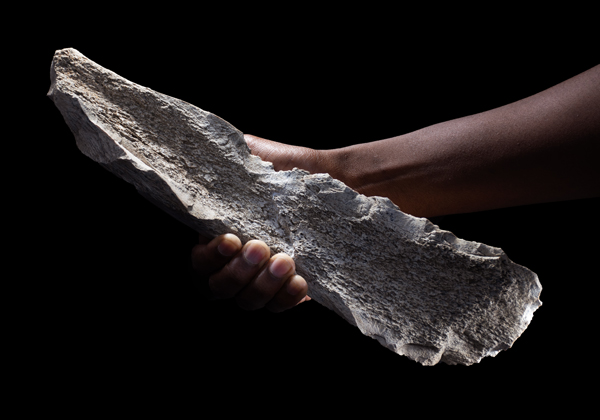New research reveals ancient humans used animal bone tools much earlier than thought
Early humans used animal bones to craft tools — more than a million years earlier than scientists previously thought, according to new research published this week.
A group of researchers from the Spanish National Research Council (CSIC) and Indiana University made the discovery in East Africa. Ignacio de la Torre, co-director of the excavation and a CSIC researcher, says the bone tools are from the Acheulean period, which is known as the age of the hand axes — tear-shaped tools with a sharp point made from stone.
“Now, we have a human species here that is able to innovate, to create an innovation by applying a knowledge they know they have or the working of stone,” de la Torre tells NPR.
Stone tools from this period are thought to have been created by Homo erectus, an extinct species that resembled modern humans, who lived 1.89 million to 110,000 years ago.
The team began excavation at an archaeological site in Tanzania’s Olduvai Gorge in 2015 and found the first bone tool in 2018. In all, 27 such tools were found, the majority of which were made from the bones of elephants, hippopotamuses and bovids, according to the new study published in Nature.
The use of bone tools by humans thousands of years ago is not unheard of, but the latest discovery reveals such tools were used much earlier than previously thought, says Tom Plummer, a paleoanthropologist at Queens College, CUNY, who was not involved in the excavation.
“Earlier in time, things that preceded Homo sapiens were making large cutting tools out of bone and some other tools as well. But this shows that it’s going much farther back in time,” Plummer says.
CSIC’s de la Torre says this signaled that early human ancestors were beginning to look at animals in a new way. Before, he says, they were viewed as predators or competitors for food sources. But eventually, these early human ancestors started to see animals as raw materials.
“That opens up a lot of potential for you to make the most to take advantage of the materials that are provided by an animal,” he says.
NPR’s Rachel Carlson and Rebecca Ramirez contributed to this report.
Taiwan’s president pledges to defend island’s sovereignty after Chinese military drills
Taiwanese President Lai Ching-te vowed to defend the self-ruled island's sovereignty in the face of what he termed China's "expansionist ambitions," days after Beijing wrapped up live-fire military drills near its shores.
Deaths reported during widening protests in Iran sparked by ailing economy
The protests began due to economic pressures, with Iran's currency rapidly depreciating. Demonstrators have also chanted against the country's theocracy.
Congress failed to extend Obamacare subsidies. This Democrat says Trump can save them
Sen. Peter Welch, D-Vt., says he thinks the Senate can pass a "retroactive" Affordable Care Act subsidy extension, but "we need President Trump."
Rideshare union rights, social media limits and other state laws taking effect Jan. 1
Every new year, public media reporters across the country bring us some of the new state laws taking effect where they are. Here are six in 2026.
Guides to help you tackle your New Year’s resolutions
From building your strength to tackling credit card debt, NPR's Life Kit has a newsletter journey to help you tackle your New Year's resolution.
Guides to help you tackle your New Year’s resolutions
From building your strength to tackling credit card debt, NPR's Life Kit has a newsletter journey to help you tackle your New Year's resolution.






